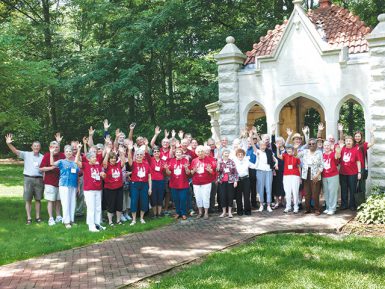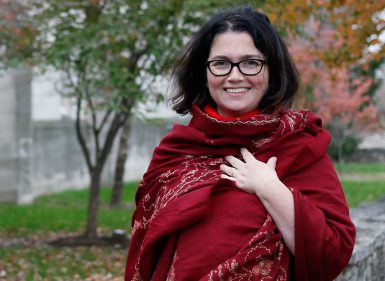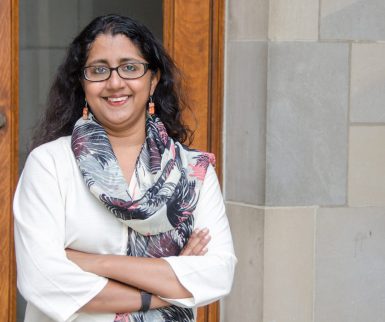Seven faculty teach Mini U classes

Faculty members have been gathering research data, assembling presentations and scribbling lecture notes, just as they would if campus were still bustling with students.
The recipients of their instruction this week, however, will not be young adult college students, however. These faculty members are taking part in the Indiana University Alumni Association and Lifelong Learning’s Mini University June 7-12.
This annual program invites IU alumni and other individuals with a thirst for knowledge to Bloomington for a week of classes and activities. Attendees may take up to 15 classes from a selection of more than 100, discussing topics from jazz piano to the psychology of chimpanzees to the Mayan Empire.
Director of IU Lifelong Learning and Mini University Betsy Watson said the program is not only an opportunity for alumni and friends to make a nostalgic visit to campus and connect with old friends, but also to engage in thoughtful and sometimes entertaining discussions.
“People who come really get into it, and take notes as if there will be a test,” she said. “Oftentimes in college, people get slotted into a path that will get them a degree quickly. Mini U gives them an opportunity to explore other interests.”
This year, more than 500 lifelong learners will take more than 100 classes during Mini U, a program that travel guides such as Frommer’s have cited as one of the best learning vacations in the country. Along with classes at the Indiana Memorial Union and other campus venues, participants explore campus, see films and museum exhibits, and attend social gatherings.
Watson said when it comes to choosing which faculty members to invite, she is mindful of a core group popular with participants year after year as well as the varied interests of prospective attendees. When preparing for the week, organizers invite faculty from departments across the curriculum to a meeting to share what the hot-button issues are in each field. They create classes that revolve around these subjects.
This year, seven faculty members from The Media School are volunteering their talents in sessions at Mini U.
Professor Emeritus Peter Jacobi
Professor Emeritus Peter Jacobi is no stranger to the Mini University program. He has taught a course at Mini U more times than he can count, he said, and his class attracts more than 150 attendees each year.
Jacobi offers his expertise as an acclaimed arts critique to teach attendees about classical music. Jacobi has covered the arts beat for publications such as The New York Times and the Herald-Times in Bloomington.
Jacobi’s 2015 session is titled, “Music to Travel For – Nevermind Space or Time Barriers.”
In addition to entertaining Mini U students, Jacobi said he hopes to remind them the many powers music possesses.
“I want them to leave refreshed with the knowledge that music can take you anywhere through sight and sound,” he said of attendees. “Music can be an escape, a release and a cure, and is out there for them all the time.”
Associate Dean Lesa Hatley Major
Associate Dean Lesa Hatley Major said she looks forward to teaching classes about media affects and news at Mini U because attendees tend to be adamant news consumers who are familiar with current events.
This year, however, Major will teach a course about a topic that may be new to attendees. Her talk, “How is Social Media Changing News Coverage?” will give her audience a lesson on media literacy in the digital age.
“I want to share a positive way for consumers of news to move forward, because we are not going back to the way it was,” she said. “Everyone has an accountability as a reader to take an active role in the information they receive.”
Major admits she is interested to see how many attendees consume news through social media sites like Facebook and Twitter, and how many stick strictly to traditional forms. Regardless of their habits, though, she said she expects hard-hitting and well-prepared questions from her audience.
Professor Michael McGregor
It has been more than 10 years since professor Michael McGregor participated in Mini U, and he is coming back with a bang. In his talk, “You Can’t Say That! Or Can You? The Boundaries of Free Speech in America,” McGregor will use real court cases, some containing potentially offensive material, to help attendees better understand the First Amendment.
“I have only 75 minutes to present, but I don’t pull any punches,” McGregor said. “People are going to hear examples of court decisions about things like George Carlin’s ‘7 Words You Can’t Say on TV,’ which might make them a little uncomfortable.”
McGregor worked as an attorney and an advisor for the Mass Media Bureau of the Federal Communications Commission, earning a vast knowledge of communications law.
McGregor said he is excited to share his knowledge at this year’s Mini U.
“They are typically an inquisitive and bright bunch,” he said of attendees. “Mini U is always a very stimulating 75 minutes.”

Professor of Practice Elaine Monaghan
Professor of practice Elaine Monaghan was new to Indiana University in the fall of 2014 and will be new to the Mini U program this summer. Monaghan was born in Scotland, then spent many years reporting for Reuters in locations across Europe, including the former Soviet Union and Dublin. In 1999, she moved to the U.S. to become the State Department correspondent for Reuters.
Although Monaghan has a wealth of experience to share during her class, “Why We Need Journalists More than Ever,” she said she expects to learn more from attendees than they will learn from her.
“The modes of delivery have changed dramatically, but the actual business of journalism hasn’t,” she said. “Journalism is a part of the glue that holds society together and has been for generations. It will remind me that good journalism is good journalism, no matter the medium.”
Monaghan hopes she can teach her students the positive impacts journalists can have on the ever-changing world.
“I hope they leave with a refreshed and positive impression of what journalism can and should be,” she said of her students. “I want to show them how they can contribute to and get information in ways we couldn’t 50 years ago.”
Professor Emeritus Ron Osgood
The lesson of Professor Emeritus Ron Osgood’s talk, “The Vietnam War/American War: Stories from All Sides,” is two fold. He said he hopes his audience will leave with more knowledge of what it takes to develop and produce a documentary film, and with an understanding of his latest project, which shares the name of his talk.
The project is an interactive website that allows users to create their own playlists from a selection of interviews with both American and Vietnam veterans of the Vietnam conflict. Osgood said he made this documentary in an interactive format in hopes that educators could tailor the playlist to their lesson plans.
Because Osgood is used to presenting this information to a younger audience, he said he is looking forward to talking less about historical context and more about the people in his documentary. He said, however, he wants to convey the same message to his Mini U students as he does to his younger students.
“I’m not trying to do a historical or political commentary with this project and talk,” Osgood said. “I am trying to tell the stories of individuals and humanize the enemy.”

Professor Radhika Parameswaran
Professor Radhika Parameswaran is a frequently published researcher on topics related to gender, race and the media. She has taught a class about her native country, India, at Mini U once before, and it was so well-received that she was asked to return.
In this year’s talk, “Navigating the New India: Women’s Turbulent Itineraries in a Globalizing Nation,” Parameswaran plans to use examples from her own life to illustrate the ways the lives of women in a developing India are changing and the ways they are staying the same. This is something she tries to avoid with her college students.
“I plan to be much more personal with my Mini U audience,” she said. “I try not to use the classroom to tell my war stories, but with this audience, situating myself in the lecture will work.”
Parameswaran said she enjoys teaching at Mini U because many attendees have a prior knowledge of India that her usually students do not possess. In fact, many the attendees of her previous presentation had visited India.
“I’m always interested to hear their impressions of India and why they are interested,” Parameswaran said of Mini U students. “It’s always an attentive, respectful audience that really wants to be there.”
Professor Steven Raymer
Professor Steve Raymer’s class and his forthcoming book of photography, both titled, The Public House: An Enduring British Institution, were inspired by Raymer’s first trip to a pub in Glasgow, Scotland, in 1976.
Raymer worked for National Geographic for nearly 25 years as a staff photographer, senior assistant editor and director of the National Geographic Society News Service. He has travelled to more than 90 countries and published six books of photography, two of which focused on India.
Raymer said his latest work in the United Kingdom has been a nice change of pace from his previous books.
“I needed a way to find an important story about social and economic change in a fun and engaging way,” said Raymer. “It’s a little less heavy, and I’ve still been able to dig out a good story.”
Raymer said he hopes to paint a picture for his Mini U class of the pub’s ability to adapt and survive, and the important role the pub plays in the lives of Brits.
“In a society that is still somewhat class conscious, the pub creates a sense of equality,” he said. “Anyone can walk in, order a pint at the bar and strike up a conversation with the guy next to them.”

